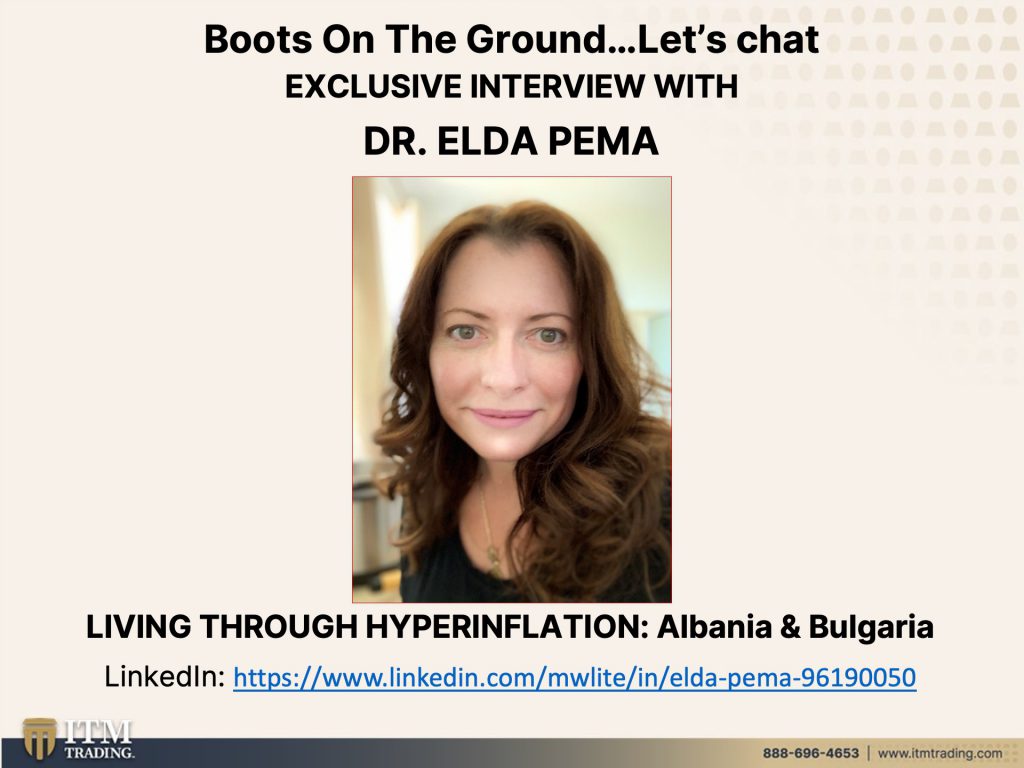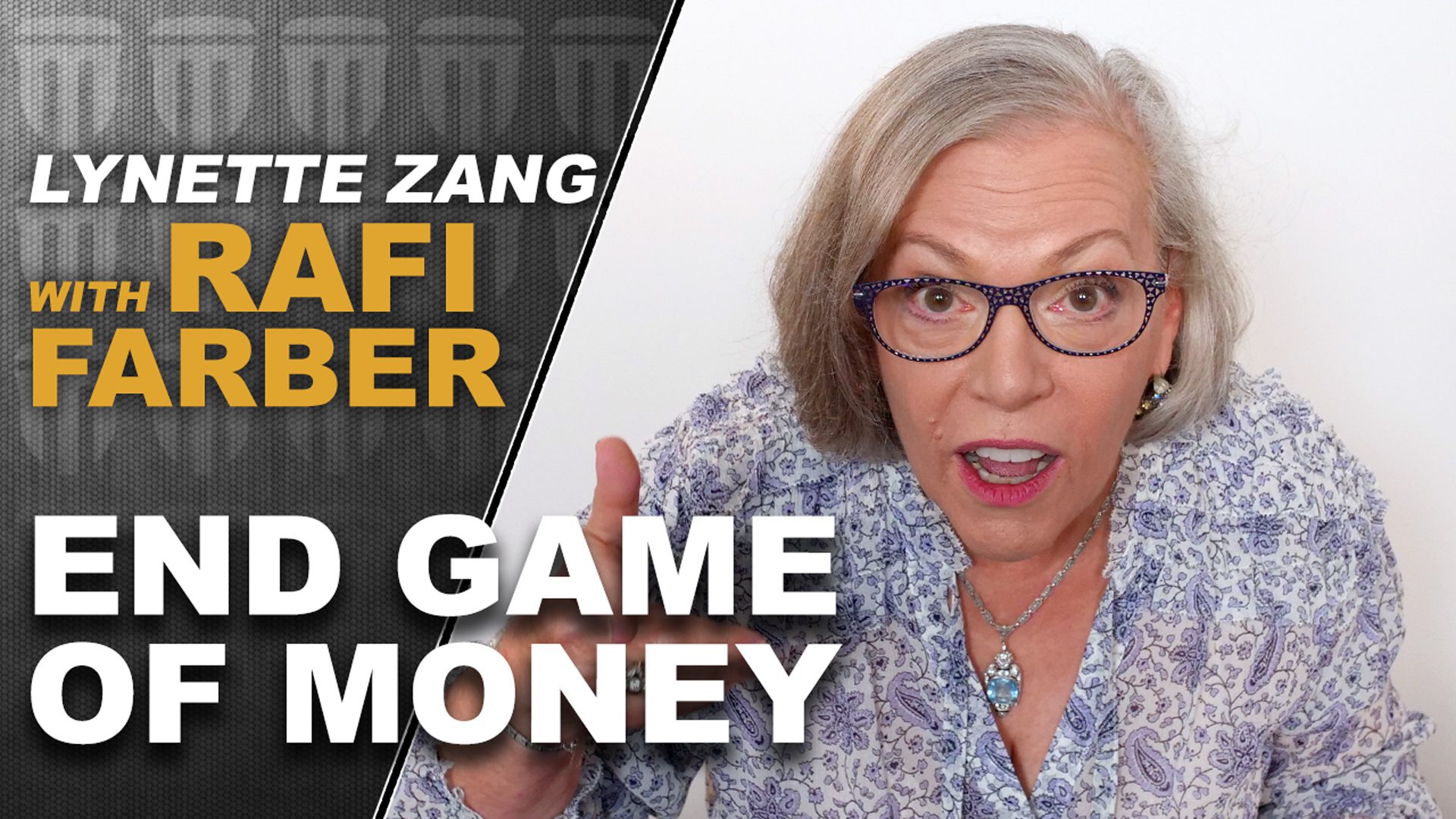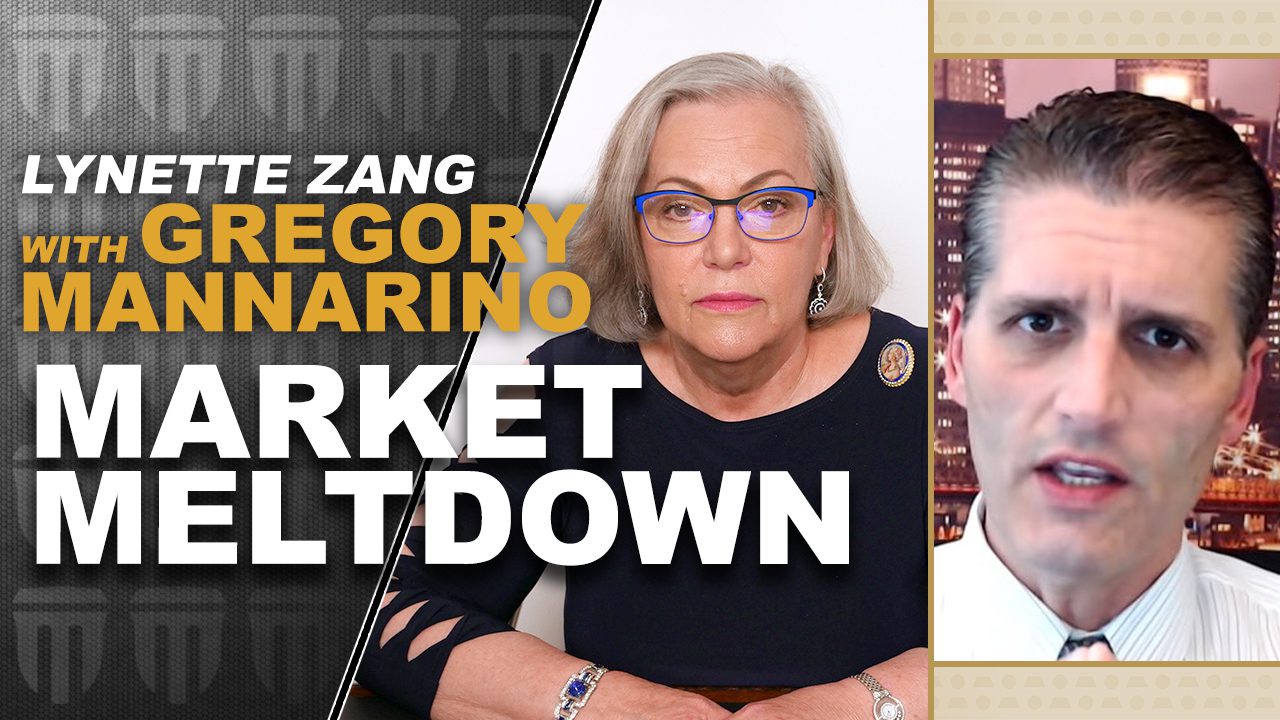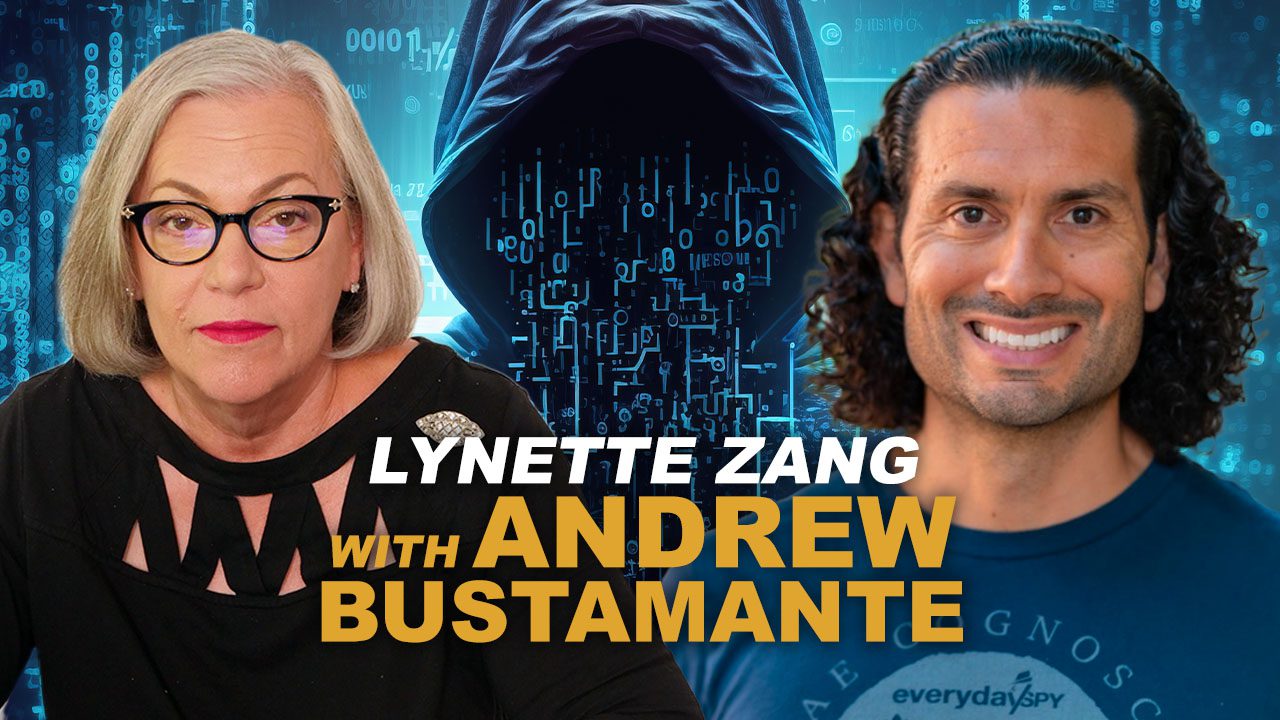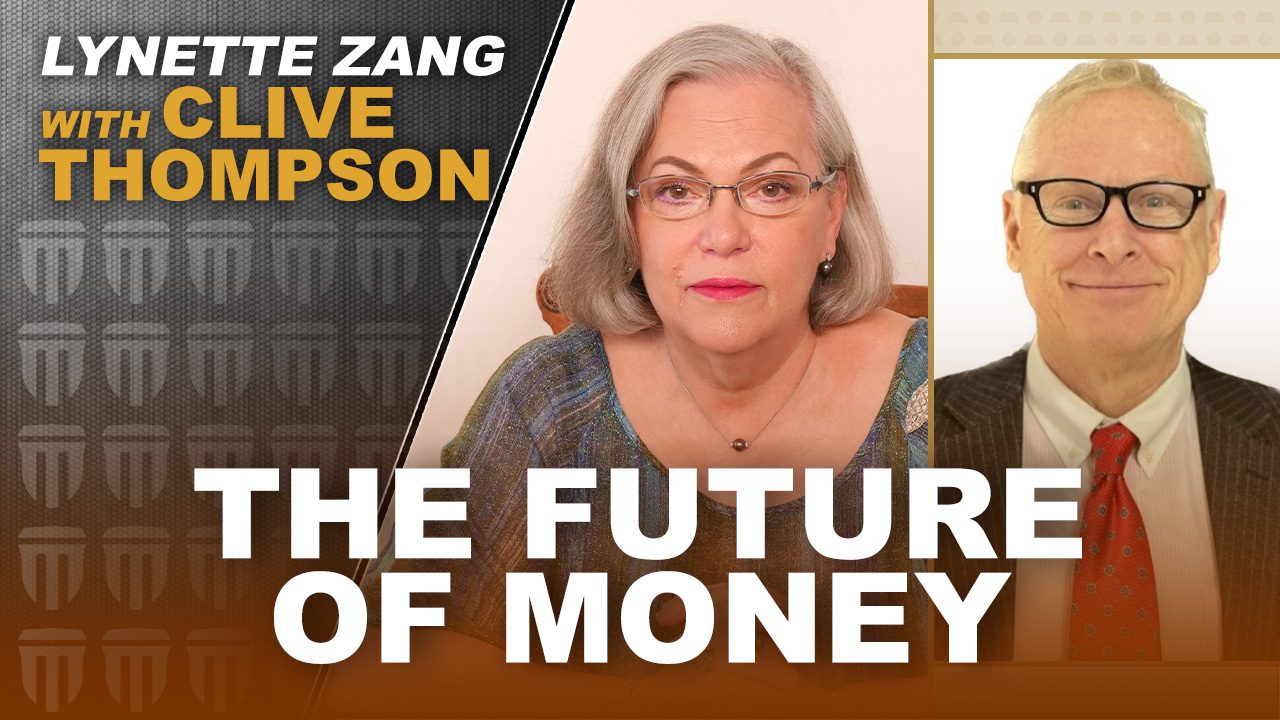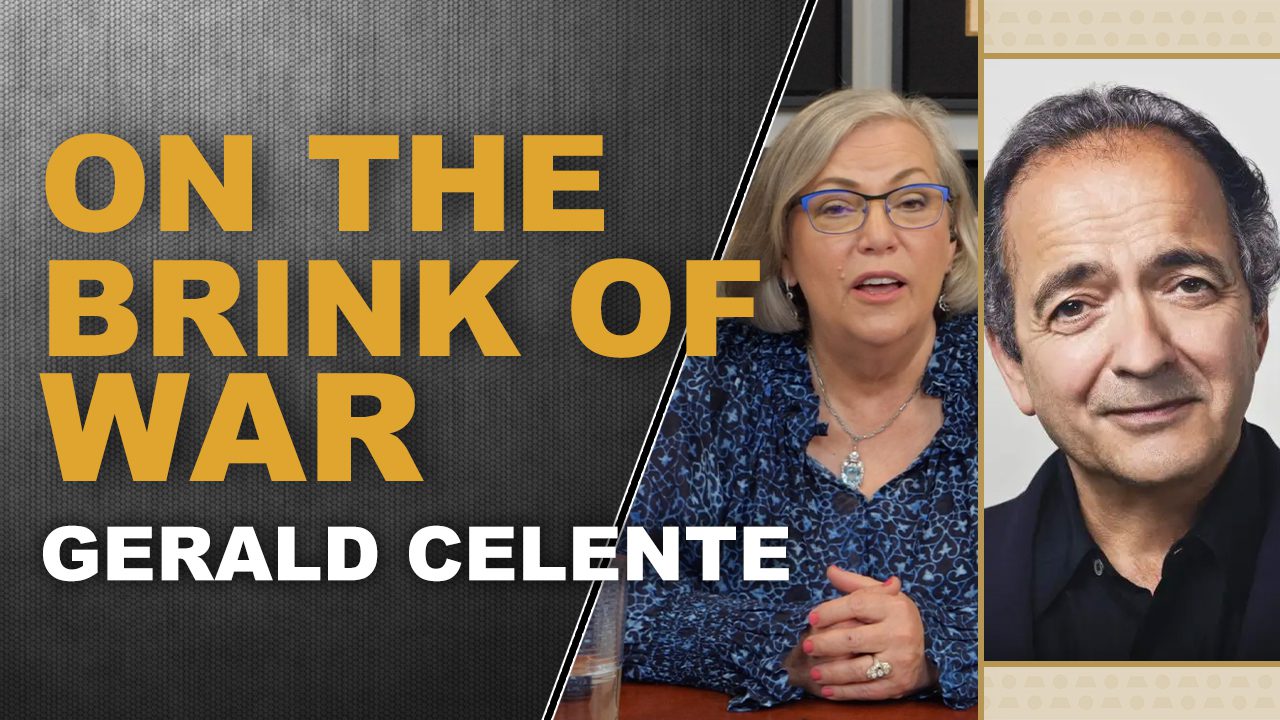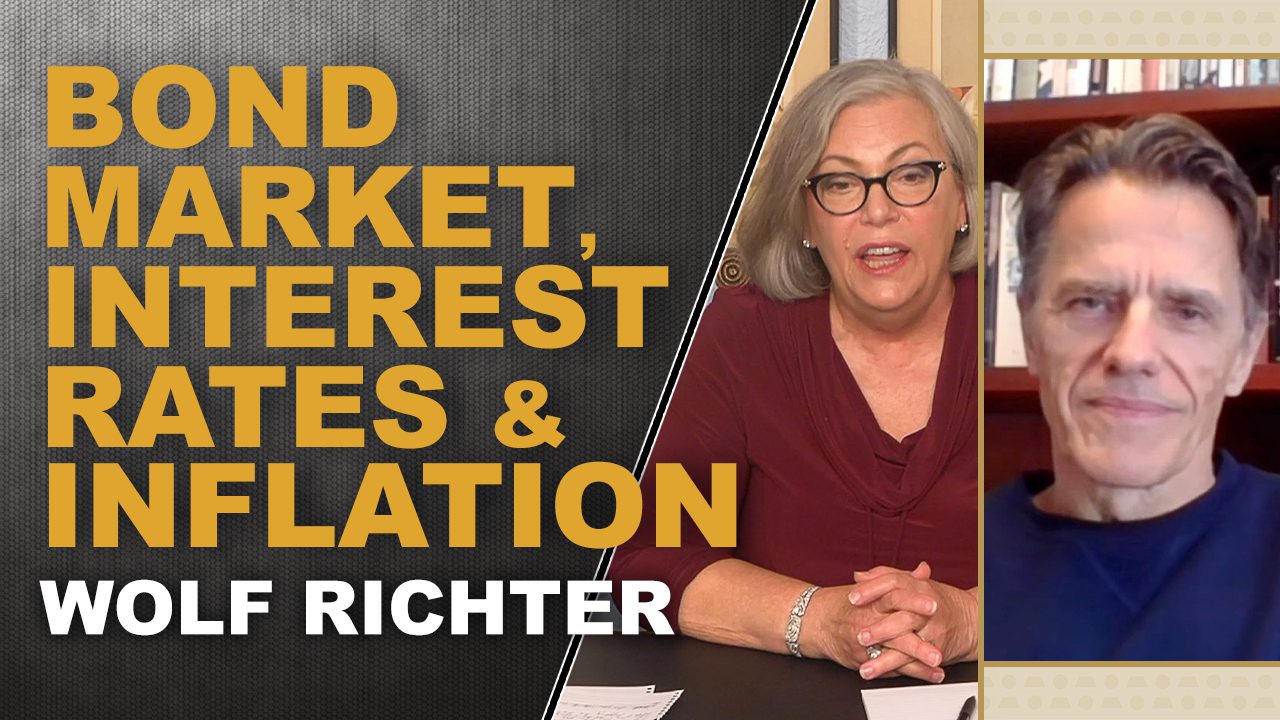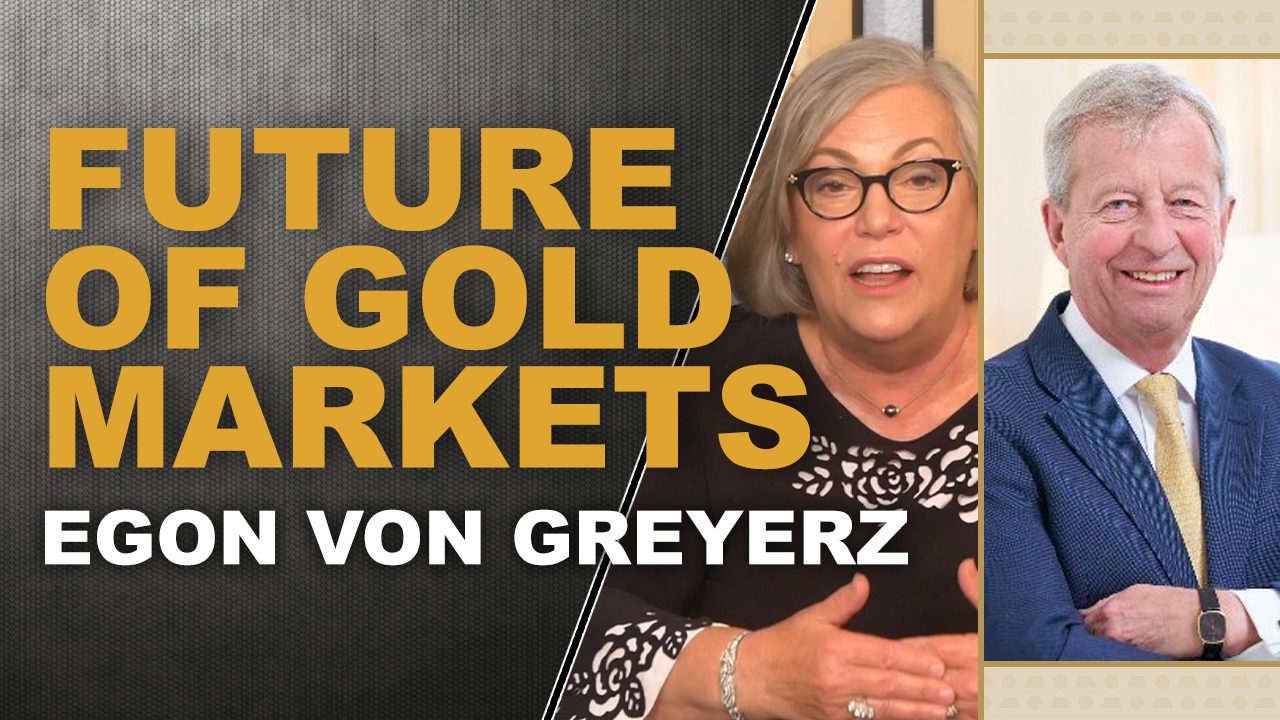Lessons Learned from Surviving Hyperinflation in Albania and Bulgaria…Dr. Elda Pema & Lynette Zang
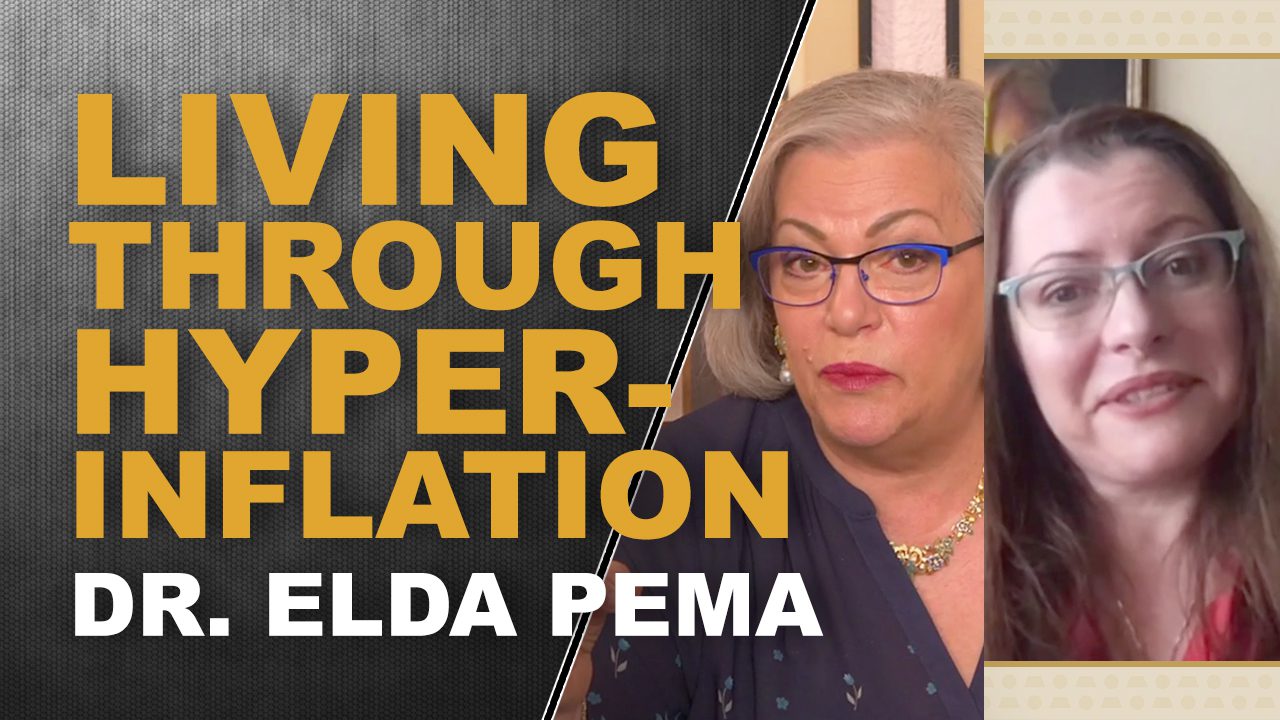
Our “Boots on The Ground” guest, Dr. Elda Pema was gracious enough to contact us and volunteer her personal and familial experience with, not one, but two hyperinflationary events. The first through her families experience of the Italian take over of Albania during WWII and the second in the 90’s Bulgarian hyperinflation as an economic student at the American University there. After Graduation she came back to the U.S. and got her PhD in Economics and Public Economics.
She is currently a People Research Scientist at Facebook and prior to that she taught Applied Data Analysis, Economics, and Labor Economics at the Naval Postgraduate School. So as an economist, she brings a critical understanding to add to her personal experience of living through hyperinflation
TRANSCRIPT FROM VIDEO:
Lynette Zang:
Welcome to our Boots on the Ground series, where we interview individuals who have actually lived through hyperinflation. The goal is to help us all be as prepared as possible for this inevitable hyperinflation. That likely lies in our very near future. Firstly, so that we can sustain a reasonable living standard. And secondly, to be in a position to take advantage of this event and potentially be better off on the other side.
Lynette Zang:
I’m Lynette Zang, Chief Market Analyst here at ITM Trading, a full service physical gold and silver dealer. My guest today on Coffee with Lynette, I’m really excited is Dr. Elda Pema and she was gracious enough to come in and talk to us because she has either familiar or personal experience with not one but two hyperinflationary events. The first through her family’s experience of the Italian takeover of Albania during World War II. And the second in the nineties in Bulgaria as sh she was a student of economics at the American university there after graduation. She came back to the U.S. And got her PhD in economics and public economics. She’s currently a people research science test at Facebook. And prior to that, she taught applied data analysis economics and labor economics at the Naval postgraduate school. So as an economist, she brings a critical understanding to add to her personal experience of living through hyperinflation, Elda hank you so much for coming today. I am so excited to have you here.
Dr. Elda Pema:
Thank you. So especially for the opportunity to tell these stories to others especially in this time that we’re living now where it’s more relevant than ever. I’d like to first talk little bit about growing up in Albania, which experienced one of the most severe dictatorships communist dictatorships in for more than 40 years. We were liberated by Italian takeover in the 44 and soon after the communists took over Albania was, was extremely poor. And so there were very few wealthy people or landlords. And so there was quite a bit of popular support for taking over confiscating the property of the few wealthy and spreading it over to everybody else. During this period, everything got confiscated all property everything stores, any kind of private enterprise all, all homes, <laugh> ranches land, anything that that confiscated as was gold as well. My family wasn’t wealthy, but my aunt married into a wealthy family. They were merchants, they had houses, ranches stores, ever. Everything was gone in an instant, everything was taken over. They were however able to hide their gold and they survived for the next 40 plus years as a family with that gold. A few years ago, my aunt actually gave me one of those pieces of gold that I, wear.
Lynette Zang:
oh, wow wonderful.
Dr. Elda Pema:
It’s it’s a French Frank from the 19th century and it’s a constant reminder that gold has always been money and was pretty much the only way for them to, for this particular family to survive. And also hold on to some of their wealth after the communist rule was basically over in 1991 a lot of former, a lot of people who owned land were able, to own houses or real estate were able to get it back. But this particular family me that I know of has spent 30 years in lawsuits, right. To little by little take some of that property back it’s. So in other words, there may be disruptions that will result in loss of say real property, but getting it back is not that’s necessarily easy. Right. And so during the time that gold was confiscated, it was, it was pretty much illegal to own/trade. However, there was there was sort of an underground economy. <Laugh> black market black market that was pervasive pretty much an in all of the Eastern block countries. And so jewelry was not illegal. So a lot of people melted the gold, you know, went to a jewelry, melted, it, turned it into jewelry and then sold it. So that was one way to convert it into the currency. And again, black market. Right. So it was it was a very interesting time, obviously that surpassed <laugh> anybody’s expectations in terms of how bad it could get. And yeah,
Lynette Zang:
They thought it couldn’t happen here. Right? I mean, right. It’s always the way people think, or they’ll say, oh, well, maybe it can happen over there, but you know, this is, this is just impossible to happen here.
Dr. Elda Pema:
It happens very gradually. Like, so for example, when communist took over, they didn’t just take everything from everybody. They took everything from the few rich ones and, and spread the wealth around. So all of the small farmers got a piece of land. They were working for the landlord before now they got a piece of land to work on it themselves. And so everyone basically supported that, right? At least the majority supported that they made sense. Now we have. So, but this equalization of the means didn’t really result in the exact equalization of the outcomes. People who worked harder, obviously <laugh> ended up with more and that was not good enough. And so the regime decided no we’re gonna equalize the outcomes too. So in the seventies, they took over the entire land. They basically got rid of all private enterprise and private property. It was made illegal. You could not run a business <laugh> out of your home or anywhere else. You couldn’t own land, you couldn’t own anything. And so when they took over all of the land and they became the owner, now all of the farmers have to work in the government land, government enterprise. And like that’s how they raise all incentives for entrepreneurship. Creativity for working hard, right. If, if you’re gonna make just as much as the next guy, why work harder than the next guy, right? Right. And so it’s a race to the bottom really characterize the last 20 years of the dictatorship, as well as what the inevitable shortages that happen. Right? Shortages and food.
Lynette Zang:
And, and well, you, you made, I wanna talk more about the food shortages because food does become the biggest issue for most people during these transitions. But you also made a really interesting statement and you’re talking about the real property, so land, which is imovable and therefore it’s much easier to confiscate and it’s much cause you can’t put it on your back and walk away with it, but your family member had gold. And so they were, and you can’t hide land either. I mean, it’s there, right?
Dr. Elda Pema:
<Laugh> right
Lynette Zang:
Right. So but they were able to do that with gold and then survive for 40 years on that real money that they got to hide. And I think it’s also interesting that jewelry was not confiscated, right? Maybe because it’s a collectible. And I wonder if other collectibles might not have also been, not confiscated.
Dr. Elda Pema:
It was traditional for people to, when at least there was a wedding or an engagement to gift jewelry and wear jewelry. And so I think that was the reason why maybe like a traditional, I think that would’ve been very hard to break.
Lynette Zang:
I was gonna say, yeah, I mean, India has been trying to do that forever. And so that might have been a push too hard because the last thing any government wants is a revolution.
Dr. Elda Pema:
Yeah, yeah, yeah. Right. So I think there was quite a bit of like affinity to go jewelry. It was hard to take that it was considered, there was, I mean, it’s not like there was no push for that. There was it wearing jewelry or excessive jewelry was considered bourgeoisie. Right. There were couples that to show their <laugh> their dedication to the regime would marry without gold bands. So there was not like, it’s not that it went quietly, but it was not illegal.
Lynette Zang:
Interesting. Yeah. Really, really interesting.
Dr. Elda Pema:
So so this was sort of like the distant past, <laugh> the less distant past when I went to Bulgaria to college, I was on a full scholarship, paid in dollars. And when I first got there, I noticed that the exchange rate between the dollar and the lev, it was about one to 50, 52 or so $1.52 Lev. And so for the next couple of years the exchange rate kept inching up to about $1 for 70 Lev. I did not see a difference in my standard of living obviously, but I did is the exchange rate right. Creeping up. And it may sound like it’s not so big, but I mean, it’s like what 40% increase. Right. Right.
Lynette Zang:
If they do that over a long period of time, it’s not so noticeable. You know, all of the Fiat currencies have lost so much of their purchasing power value. So were you getting money to live on in Bulgaria, in dollars at that point? So you actually were probably better off then because you had dollars.
Dr. Elda Pema:
I was very well off, but not quite. So I thought I was shielded from what happened afterwards. You wake up one morning and you find out the exchange rate is about a thousand. Have to $1 I’m sorry. Yeah. A thousand left to $1 mm-hmm. And so you think, well I’m in the money, right? <Laugh> dollars. Not quite.
Lynette Zang:
Really.
Dr. Elda Pema:
Okay. Whenever, no, whenever these interesting big economic shifts happen it’s it’s like a storm. It might not affect everyone the same way, but everyone does get affected <laugh> and so, right. So the first thing that happened was because the exchange rate was changing. Like within hours, I would lose money if I exchanged any anything bigger, like big, big bills, any big bills were just not a smart move <laugh>. So I was only exchanging like a dollar $5 at a time.
Lynette Zang:
Well that sounds like when I was in college, I was exchanging $10 at a time <laugh> taking $10 at the bank, but yes. Okay. Go ahead. Sorry.
Dr. Elda Pema:
No <laugh> so yeah, I mean, it’s not like normally I would exchange more, but I would exchange so no, I, I used to have like a budget for the week and I would exchange that money at the beginning of the week and then carry on. Right. That was just not possible anymore. So the trips to the exchange bureau were basically happening daily. And once I run out of the one and $5 bills the next question was, well, how much money am I losing by exchanging a bigger bill? Right. Because every transaction had to be carried out in Lev. So if I exchange a $20 bill and I get this Lev, that tomorrow will be used less, I’m still affected. Right. So then I thought, okay, well the best way then to deal with this, when I only have big denomination, like twenties, I was a student <laugh> right. Not much better than that was to just buy stuff. So if I buy the things that I can predict I’m gonna need in the next, you know, few weeks, then that could be a good strategy. So then you go to the store and all of the price stickers are gone. <Laugh> because all of the sellers have now realized that they’d be losing money. Right. Mm-hmm <affirmative> if they sell at the old price mm-hmm <affirmative>. And so you have to ask the, a seller for the price of every item in your basket and they can’t just quote your price. They will go with their little calculator, figure out what is the spots exchange rate mm-hmm <affirmative> and give you a value at that point in time. So you are basically getting a different dollar, I’m sorry. Yeah. Dollar value, your left value at any point in time, you wanna shop transaction costs at this point, have completely ballooned, right. Imagine going through a checkout lane like that.
Lynette Zang:
Yeah. <Laugh>
Dr. Elda Pema:
And eventually this got way too costly, but also very unpredictable. So from a seller’s point of view, they don’t know whether it’s better to sell and get worth less, possibly worth less currency or not sell at all and hold onto the stuff to the wears they have in their, in their store mm-hmm.
Lynette Zang:
cause they can’t replace them. They couldn’t replace them for the same amount that they were selling them at.
Dr. Elda Pema:
Right. Exactly. So then eventually figured out that tying their prices to the spot exchange rate was still not good enough. And so all the stores within a week, all the stores were boarded up, closed.
Lynette Zang:
Would that be? Because they were looking at an official rate, which was one thing. And when they had to buy product, you know, it was,
Dr. Elda Pema:
The rate was different. The market rate, they would look at the market rate. Like if I were to go to the exchange bureau, what would I be getting?
Lynette Zang:
Right. That’s the official mm-hmm. Right.
Dr. Elda Pema:
The, the problem was that it was just too uncertain, like business carrying out business was just too uncertain. They just didn’t know if I sell it at this exchange rate, I could sell it for more an hour later. Right. Should I hold on or what? And then if I do get left, is this gonna be useless tomorrow? So in other words, like the whole faith in the currency was eroded to the point that it made no sense to carry out business using that currency.
Lynette Zang:
So, so there are a few things about that, but you know what, as, as a student, you might have had a different perspective, but you were studying economics. And so at what point did you see the general population or did you see the general population lose confidence in the lab?
Dr. Elda Pema:
Oh, everybody did. And it happened, it happened really fast within the span of a week, as in wow. People waking up and finding out that their monthly salary was now worth a couple of dollars. It was so drastic. So fast that within a couple of weeks, the exchange rate went from one left to 70, I’m sorry, $1 to 70 left to $1 to 3000 left.
Lynette Zang:
Wow in one week!
Dr. Elda Pema:
And then people started coming out on the street and protesting. There was, people, obviously who were hit the hardest were retirees, anyone who worked in the past and collected old Lev <laugh> old as in pre inflation <laugh> they saw their savings erased within a matter of days. And and with no opportunity to reclaim that once the economic situation was brought under control.
Lynette Zang:
Once they put in, in Bulgaria, they put in what a currency stability board?
Dr. Elda Pema:
They put in a currency board, they pegged their currency to the Deutschmark. So at this point they basically had no more control over any type of monetary. Like they had no more monetary policy, they could carry out, it was whatever the central bank of Germany decided to do, that they had to go with it. However, what this did was pretty aid, some trust sort of bring in the trust that was lost in the currency, in the public. So they could, again, accept lev for transactions.
Lynette Zang:
Well, when I saw that, you know, and I was studying, I was reading about it and I thought to myself, well, because we see this down in, in Venezuela right now. What if every currency on the planet is hyperinflating at the same time? Where are they gonna go? I mean, I think that what they’ll do is they’ll go to gold
Dr. Elda Pema:
And, and even though like, that was a solution. Yeah. <Laugh> exactly, exactly. And the gold. Exactly. Yeah. That was a temporary, like that was a solution to get out of the crisis, but it came with a lot of cost. So it’s not that, you know, we could hypothetically believe there is one currency in the world that is still stable and we could all peg to that and solve all of our problems with hyper
Lynette Zang:
<Laugh>. Well, the problems aren’t the currency. The problems are the governments and the central banks, the problems, not the currency.
Dr. Elda Pema:
Exactly. So that’s sort of like fixing or putting a bandaid on the problem and maybe, you know, continuing to run for a bit. But there were a lot of people who lost everything, obviously. I, with like, within a couple of months, I had currency that in the pockets <laugh> of jackets that was no longer in use no longer in circulation, they retired all of the small denominations.
Lynette Zang:
So, so did they do a re-denomination of levs? Did they do a re…because if they then pegged it and people couldn’t, how, how, why?
Dr. Elda Pema:
Basically inflation, whatever inflation was like built in the system at the point where they created the currency board. That sort of became permanent as in. And so all of the one and two and five left currency, like denominations were just useless at that point, there were mechanics using the coins to make like washers to fix cars. <Laugh> I mean, it was just worth mroe for scrap matter. Yeah.
Lynette Zang:
So, so so savings were wiped out. and there was no opportunity even with that currency board, even with the promises that this was gonna fix it, there was no way for the normal person to…
Dr. Elda Pema:
Recover, recover. So things basically were stabilized to the point that we could, that the country could go on and the stores could open and business could continue, but what was wiped out was wiped out permanently. And so that was, so in other words, there could be a solution, hypothetically, if there is a stable currency in the world for situations like these hyperinflation, but you know, when it comes to the individual who is trying to preserve their wealth, that’s not a solution. It’s just the solution for going on from the disaster.
Lynette Zang:
Well, there are always, you know, what we know is a hyperinflationary event is a massive wealth transfer. So the IMF, interestingly enough, the IMF did a study on Bulgaria. And I wanna just kind of read this for you, and then I want you to tell me what you think about it. Okay. This is from the IMF, “the near hyperinflation <laugh>. I love that the near hyperinflation of late 96 and early 97, although difficult and costly helped ensure the viability of the currency board by reducing the real value you of domestic debt, which had initially been a threat to a balanced budget. It made fiscal management without recourse to the central bank possible without recourse. I love that. Furthermore, it gave banks breathing room by rapidly devaluing their domestic currency liabilities while increasing the real value of the dollar denominated government bonds they held. So, you know, you can see the IMF thought that that hyperinflationary event was very helpful. What do you think about it?
Dr. Elda Pema:
Well, like you said, there was a transfer of wealth and that was from the average retiree in the country to the banks, right. The banks were able to reduce their debts, held in lev and increase their assets held in foreign currency. It’s a solution right. To banking crisis.
Lynette Zang:
They thought was great. Yeah. And that, and that’s really who we’re talking to, are the people, the normal people like you and like me. So what do you think about the real solution to it? I mean, was not a hundred percent of the population ended up in abject poverty, but certainly a large part did. Right, right. So what, what could, what do you think they could have done? I mean, it, it’s kind of interesting cause you’ve had, you know, two different experiences in the family. Did your family do anything after the first one to protect themselves from the second one, knowing what they knew with the gold and all of that?
Dr. Elda Pema:
Unfortunately, Albania was so poor that there was no way, like once the communist took over, there was no way to create wealth that then you could amass in any way. Like the entire future, financial future, economic future depended on the government. Once you retired, you were paid what the government decided to pay you cuz no private enterprise was allowed. There was no way for you to build wealth of any form <laugh>. And so there was actually no credit system in Albania at the time. So if you wanted to buy say washer and dryer <laugh> right. People would get into these pools where they would pay into the pool. They would pull the money. Like 10 families would pay into this pool, pull the money and the family one family would take that money and buy a big ticket item. But <laugh>, you know, there was no banking sector to lend money <laugh> or, or like this is like the level of financial of the financial sector in Albania at the time.
Lynette Zang:
Did they go to barter? So they went to barter amongst themselves too bartering, maybe services?
Dr. Elda Pema:
There was a lot of that. Yes. the black market was basically were most things. Most transactions happened. Once the, communist took over the, all the land, especially with the farmland, that’s when the that’s when all of the food shortages hit. And so it was very, and then of course we broke off all diplomatic relationships with China and Russia who were held us economically with food. And so this is the point where it really like the grip really tightens. We couldn’t leave the country, no one could come into the country. You couldn’t own anything <laugh> you were basically if, if you spoke about any of this as being bad, you were jailed for life or worse. Your family was interned in some like remote village with no water or electricity. So it like the grip really tightened during those years. And food was rationed. People spent most of their day in lines to get their rations, having a ration didn’t mean that you would actually get it. You had to stand in line to get it <laugh>. And so a lot of the, like there was food that was sold on the black markets for people who had the money. And so I think that’s when most of like any amount of money, anybody had went to food for at least a couple of decades. And so there was no way to build wealth enough to <laugh> have enough to buy coins, gold coins and save it. Whatever was built before the communist took over, that was it.
Lynette Zang:
Fascinating
Dr. Elda Pema:
Prosperity? The word prosperity was just wiped out <laugh> of the vocabulary.
Lynette Zang:
Unfortunately I think that’s where we’re headed because even as you were explaining, you know, borders and you know, the control of the government, I mean, I kind of think I see a lot of that starting to happen and people going, oh no, that can never really happen here. But this feels that this feels to me, like the beginning of it, I haven’t lived through it. What does it feel like to you? What are you seeing and how are you and how are you responding to that? What are you doing to protect yourself this time?
Dr. Elda Pema:
I’ve been very nervous since last year. I sort of like had this premonition. I was feeling it in my gut, that things aren’t going the right way. I am extremely nervous about what’s happening. Currently, as you described with the closing on the borders, the what you what’s allowed to be said in public that is extremely, you know, that’s going in a way that’s was really in my experience, it was so extreme that, for example, you couldn’t say the word God, and if you were watching a foreign movie on Albanian TV and someone in the movie said, my God, the subtitles would censor that word out. <Laugh> it was that extreme, like the, was you, you know, that they were censoring foreign actors <laugh>
Lynette Zang:
Yeah. Unfortunately you know, there are a lot of us on YouTube that feel very censored.
Dr. Elda Pema:
Yeah. And so that to me is very concerning. Albanians, weren’t stupid to jump for this at the beginning. It crept up on them little by little, by little by little there was always like a good selling point at the beginning, but once the government had complete control, then they could do anything. And any dissenting voices were key jailed families intern. And this is actually the way that, that they were able to maintain control that the families would take the brunt of the of the punishment.
Lynette Zang:
In other words. They used fear.
Dr. Elda Pema:
They used fear coercion, anything. Yeah. yeah.
Lynette Zang:
Was it ever a point where it was like neighbor that, you know, like early in the beginning where they would have the neighbor police neighbor kind of thing.
Dr. Elda Pema:
Oh, for entire time, the entire time. So you could be having a very bad day and having a drink with your friend and you say one word too many, the friend would be ratting you out. I know personally people’s lives were destroyed that way. They said something to a friend they couldn’t, they shouldn’t have said.
Lynette Zang:
To a friend, I mean to a friend, to a friend. Yes.
Dr. Elda Pema:
And so yes, it was, that’s what they relied on to enforce this. Right. They didn’t have policemen in every house. Right. my grandfather was very outspoken <laugh> and so he would just, you know, be speaking in the house. He would be speak out and yelling was like, he’s a crook or whatever. And we were like hush hush no, keep, keep quiet, keep grandpa quiet. Cause somebody might hear before the neighbors hear it. <Laugh>
Lynette Zang:
And we’re seeing that in like the recent law that was passed in Texas. And I know up in Canada where neighbors are supposed to let you know if somebody’s supposed to quarantine. So we’re seeing that same kind of behavior again on a global basis. Aren’t we?
Dr. Elda Pema:
And I’m sad to say that, that works.
Lynette Zang:
Well. It does. It makes your world really narrow and you can’t really exchange ideas. Yeah. Right. Which is why, you know, which is why, what you’re doing by volunteering your story. It’s critically important. I mean, I can volunteer my research and I can give my opinion, but I have not lived, I’ve lived through a currency shift because I was alive in 1971. And I remember that as a teenager, you know but really I haven’t gone through what you went through in Bulgaria, and most people that are looking at this probably haven’t. But if anybody has had that experience, please send that to (services@itmtrading.com) If you’re willing to come on and share your story because it’s really, really important. So I want to go back to what parallels can you see, you know, with your, with your 2020 hindsight of what you lived through and as an economist today, what are you seeing? Do you think this time will be different because that’s what everybody thinks.
Dr. Elda Pema:
Well, history repeats itself so that it might be different. I doubt that, socially, I’m seeing a lot of what I experienced growing up in Albania. As far as like the economic sector, I’m seeing a lot of what preceded the economic collapse in Bulgaria, the hyperinflation of Bulgaria, the reason why they had hyperinflation was this quantitative, easing. They were injecting money into the economy. And so that’s been happening in overdrive. Yes. In this economy <laugh>
Lynette Zang:
Hyperdrive, you might say
Dr. Elda Pema:
Exactly. So that concerns me a lot. Seeing that the economy didn’t collapse. So I, I know a lot of people are nervous about the state of the economy and they think that this is the United States. Nothing Horrible’s gonna happen here. Well, nothing happened, nothing horrible in the big picture happened in Bulgaria. Either people still live, they’re still a country right. Called Bulgaria. But that doesn’t mean that the lives weren’t destroyed financially speaking and wealth wasn’t eroded. And so maybe something big might happen and the United States will still continue to be <laugh> I, as I hope and wish, but that doesn’t mean that that individuals are not gonna have a hard time financially for, for a period of time or forever as a result of that.
Lynette Zang:
So what are you doing if you don’t mind sharing and you don’t have to it’s, you know, but, but how has that changed your perspective and what you’re doing for yourself, because you also mentioned retirement.
Dr. Elda Pema:
Yes. So I’ve personally been when, when I first found your channel, I was, it, it felt like a very ballsy move to liquidate your retirement and take it out of the system. I was like, whoa, that is so original. I never thought. And then I’ve been like for the whole year, I’ve been mulling that over and thinking, I think getting the money out as soon as possible is probably a smart move. And so I’ve been converting my savings into into precious metals. I’ve been talking to someone at ITM.
Lynette Zang:
Hidden very well and not in your home.
Dr. Elda Pema:
Not in my home. Right.
Lynette Zang:
We just wanna make that point.
Dr. Elda Pema:
No, it’s not, it’s not worth breaking in for sure. But, I’ve started to liquidate my assets in my retirement account. Because just in the past few weeks there’s been major downturn. And so I feel like that’s like living on borrow time, but the retirement money is living on borrowed time. And so my plan is to eventually take the money, all of my retirement money out. And maybe leave just some, because I’m not like, I guess I haven’t gathered like mentally to the point <laugh>
Lynette Zang:
It’s hard to believe.
Dr. Elda Pema:
It’s very hard. Even as an economist, even with all of that, you know, life experience.
Lynette Zang:
Didn’t the Bulgarian stock market raise as the currency was going into hyperinflation. Didn’t that go up?
Dr. Elda Pema:
I believe so. I wasn’t in the market. I was a student at the time <laugh> right.
Lynette Zang:
But it did. So people rush into the market, which is denominated in the Lev and the markets go up and they think isn’t this great I’m making money, but the purchasing power value of the underlying currency, which is the only you can convert it into others. Yeah. Right. And you know, so you, you and you also talked about Cypress and I’ve talked a lot about Cypress over the years. Very interesting. How they tested out, you know taking bank accounts with and without deposit insurance scheme and the retirement plans. Do you wanna talk a little bit about that as well?
Dr. Elda Pema:
Right. So as now I’m thinking about how best to protect my retirement savings. That case has been in my mind a lot, because what happened in Cyprus to save the country from a financial crisis the government negotiated, I think a 13 billion deal with the IMF and other European banks. And according to this they would be bailed out, but what was the catch? Any accounts over a hundred thousand euros, which may seem like a big amount, but it’s not, if you’ve worked all your life for that, right. It’s about what now, $110,000, any amount above that was basically taken, stolen really. And it lost about half of its value and it was converted into shares into the bank. The failing bank
Lynette Zang:
Sounds like a deal to me. <Laugh>
Dr. Elda Pema:
To buy shares into a failing bank. That’s a great investment, right? <Laugh> imagine your life savings going into that <laugh> deal. And so there is a president and more than one of governments basically taking over retirement money. It’s, it’s just, I feel like especially it it’s just too easy. <Laugh>
Lynette Zang:
Right. It is because that all that wealth is so sitting there, sitting there, there is no trustee, that’s gonna say, oh, government, no, we’re gonna protect our clients because basically they take your wealth. And then this is not true in, in every case. And you’d have to look at the individual documents, but in many cases, they get to use your equity as collateral and borrow. It’s not really your equity. Once you make that deposit, you have to read the fine print, you know, you’re loaning the bank, that money. And so you’re a creditor just like everybody else, which is why they could easily take that. The other thing about Cyprus that I found really interesting and we could Edgar, would you find that graph? And it, you can just remind me, but I came across this graph that showed like the other European banks and German banks and how once the one Cyprus became part of the European union. Right? They made all these massive deposits, but then they started getting out, you know, like exactly. Whereas the general population, they just keep their money in there. It’s sticky, you know, do you think they knew something? <Laugh>
Dr. Elda Pema:
Yeah. It’s like, so in my experience, so far my life experience in these countries with very shaky economies and big financial disasters happening is that it’s very hard to trust the system and it’s small people that get to carry the bag at the end. So there’s, we need to look for ways to protect the wealth that we’ve created in that, that do not involve the, that does not involve the system exactly. Or at least a portion of that wealth, if we’re not comfortable with all of it,
Lynette Zang:
You know, I have my mantra, which you’re probably familiar with food, water, energy, security, barterability, wealth preservation, community, and shelter. Yeah. So if you look at that, is there, is there, I mean, would you were able to get yourself positioned in each one of those areas and I, and under the food, I always kind of think of medicine for anybody that has a chronic illness, because what happened to medicine during this period of time, couldn’t get it right? So you know, if somebody actually execute, you did that strategy, which I personally have, you know, do you think that that would, what kind of, do you think that that would really offer enough protection? Or is there something else that we should add to it or is it too much, or what do you think about that?
Dr. Elda Pema:
I think that would be a lot of protection. So for example, growing up all houses in Albania did have a little garden and some chicken, so we wouldn’t go hungry. But those gardens were eliminated over time. And so that self-reliance was basically taken over <laugh> or, or sort of like taken away little by little. We ended up with a generation that didn’t know or considered it backwards to have chickens in the backyard. So I do believe that having some source of food that doesn’t depend on stores or anywhere else is definitely, I just wonder, like, to what extent self-reliance is possible in the United States, because there’s been many more generations here. Okay. I did grow up with backyard chicken because my grandmother had them <laugh>, but my husband who’s American didn’t <laugh> right. How many generations in the U.S.HHave grown without knowing how to right.
Dr. Elda Pema:
I really enjoy, like I’m enjoying the trend of seeing people plant more I also think that in the U.S. There could be ways that do not involve full, you know, live out of your backyard. <Laugh> right. So there’s farm small farms and people are organizing yeah. Communities from the farms, communities. Right. So communities where you can get the food from a farm and help out or arrange some way, right. To have access to that without having to become a farmer ourselves, that could <laugh> that I feel like it would be sustainable. So maybe not going all the way, but figuring out some middle way. That doesn’t involve you getting the car and going to the store or would be would be definitely the first thing to think about. Right. We need food <laugh>. And so what, what else would I add there? Well, obviously I would add gold.
Lynette Zang:
Well, that’s the wealth preservation piece. Right. And, and also, you know, a bit of the barterability though, I personally prefer for silver for, oh, this is more gold. It’s normal. Yeah. Sorry, but this is, you know, I personally prefer silver for barterability because as you pointed out earlier, you know, you’re gonna get change back in what the currency that has no value or Greece when they couldn’t do the cash, they were giving you, you know, chewing gum or lollipops or candy bars, or, you know, whatever they actually had that they could make change with.
Dr. Elda Pema:
The only thing I would add based on my experience would be some currency that you might believe. It’s not going to go away. So in Albania, for example, dollars in Deutschmarks or euros were considered safe. And so we had major mass migration in the nineties and Albania never really experienced hyperinflation because there was so much foreign currency coming into the country. People working abroad and bringing currency into the country. And so it was actually very acceptable in Albania to carry out the transaction in foreign currency. Like, especially if it was a big ticket item, if I wanted, I take it to the U.S. I would use dollars. So if we do believe that there are countries out there with currencies that might be more trustworthy than the, dollar.
Lynette Zang:
Do you see any?
Dr. Elda Pema:
No, but I just think a little bit of that for transaction purposes, initially yes. Before everything goes down.
Lynette Zang:
Exactly. And, and I agree with that. That’s actually part of, I don’t know, I don’t know if you’ve looked at the strategy, but it’s based upon, you know, just those repeatable patterns. And so, yeah. I, I mean, I agree with you that there’s a certain level of currency that you need to have initially, because that’s what people recognize. But then as you pointed out, as the currency loses purchasing power and the merchants can’t replace the goods for what they could sell them to you for, then that’s where you, that’s where the silver comes in. and you know unless they confiscate all property, that’s also, your property taxes are gonna go up like crazy. And that’s where the gold can come in, as well as protecting whatever you choose to keep inside of the system. I guess I’m, I guess I’m pretty brave, but I think I’ve been groomed for this moment in time, really my entire life. So watching the, watching the currency life cycles and the U.S. Dollars was the one that I was really paying attention to the most, for obvious reasons. And seeing the technical confirmation at the end, that was back in 2002, I came in June 28th, 2002. No was it, yeah, it was October was like the final confirmation. So I believe it <laugh>, I mean, I believe it with all of my heart. So I personally don’t own any Fiat money products because I don’t see the point in them. They’re severely overvalued. And, and not just because people bid them up, but because the real trend is the purchasing power value of the currency. Yes. So, you know, you can see it going up, but if the currency is not accepted, if all confidence or I shouldn’t say if, when all confidence in the currency is lost, what do you have?
Dr. Elda Pema:
Yeah, yeah. There’s way too many countries and many points in history where currency is devalued to the point where it’s not worth the paper it’s printed on. And so it’s very wise to plan for that time.
Lynette Zang:
Exactly. And I love that you’re wearing the French Frank around your neck. Yes. Because that is a constant reminder, you know, the, the Fiat money, Frank has no value, but that little gold coin there, which is what roughly a 20th of an ounce of, or not, that’s probably a 20 Frank. Right.
Dr. Elda Pema:
It’s a small denomination. I think it’s five,
Lynette Zang:
It’s a five Frank? I can read it.
Dr. Elda Pema:
I can’ read it.
Lynette Zang:
So it’s a little piece of gold.
Dr. Elda Pema:
It’s a 20 Frank.
Lynette Zang:
It’s a 20 frank? So that’s what 0.1875, or something like that. And gold content, wait, something like that. I mean, I could be off, so check you guys if you’re gonna, you know, just check on that. But that’s what I actually own. Lots of Franks. I love them as well as other, but it all depends on what you’re trying to accomplish with the Frank or with any of these small denominations. It’s a whole strategy. Could you, you know, could you see, I know you were young during that period of time, but did you see wealth transfer happen? Did you see people from other countries that had currencies, like the dollar or the deutschemark have the ability to go in and buy assets in Bulgaria?
Dr. Elda Pema:
Absolutely. Yeah. In Albania they did buy property. So yes, there was wealth transfer. I was just thinking back to the question of what am I doing and the reason why I, I just had this realization of the reason why I’ve been so risk averse and not really act on, you know, what I know to be possible to happen right. Is because, once you come to the United States and the United States is such a big, I’d say, has this, this reputation of really being one of the strongest countries economically, it’s very hard to wrap your mind around the possibility that that may not continue to be so, and so it’s, I think for people who haven’t had these experiences, it’s even harder to believe that, you know, something financially destabilizing that is of this proportions can ever happen. And so it’s, but if we look at what’s happening and the trends with monetary policy, there is no there is no other outcome, you know, that involves no wealth transfer. <Laugh> no devaluation. And then, you know wealthier people with possibly carrying some other currency or gold <laugh>
Lynette Zang:
This is the safest currency. And it is really interesting because you made the statement that you know, that you are hesitant to do all of it because you’re risk averse. But if you look at what the Bank for International Settlements says, this is the only, the only financial asset that runs no party risk. Right. And when you look at, you know, as an economist too, when you look at global central banks, I see them as between a rock and a hard place, because the interest rates, do you think they can raise interest rates?
Dr. Elda Pema:
In these, in this, in these conditions, in the U.S.? No way, no way the labor market is thinking inflation is high. You raise interest rates, literally recession. No, there’s just no way.
Lynette Zang:
And you know, I mean, as an economist too, let’s kind of stay on there for just a minute. I know we’re going a little long, but I, I find is really fascinating to tell you the truth, because you have the central banks coming out and saying that they have the tools and saying, you know, and, and basically Powell saying, oh yeah, well, I’ll, I’ll raise interest rates, but you have other countries that are doing that right now. Like Mexico is one that I can think of off the top of my head and it’s not helping their currency. And that’s because it’s not a demand issue. It’s a supply issue. So, you know, I see them as being between a rock and a hard place. How do you see this whole global circumstance?
Dr. Elda Pema:
The most recent experience we had in the U.S. with this situation was in the seventies with Carter and the only way that they were able to overcome and come out of it was over reducing, tightening the money supply interest rates shot up. The country came to basically standstill businesses when bankrupt. In fact, I lived in this house where the land lady told me that at the time she owned multiple properties, rental properties. And she told me that the rate that she was paying the mortgage rate was in the twenties. 20% something during those times.
Lynette Zang:
I had one up at like 12%. Yeah.
Dr. Elda Pema:
That is the cost, right, or what it would take or what it took the last time this happened in the U.S. to tighten my supply, bring hyperinflation down. I do not see people being able to survive mortgage rates of those proportions.
Lynette Zang:
Yeah. It’ll kill the real estate market, which is…huge!
Dr. Elda Pema:
Yeah. If interest rates go up and nothing happens, it’s because the jump needs to be a really drastic for something visible to happen in terms of like inflation coming down. And I do not see under the current circumstances, I do not see that move.
Lynette Zang:
Yeah. There was, there was one more thing that happened in the seventies, which is when Nixon handed over full control of inflation to Central Banks. And so we did, we did shift the currency and personally, that’s what I see coming up with CBDC’s. So we went from a gold back currency to a debt back currency. Now we’re going to a programmable currency. Yes. I don’t know about you. That scares the hades out of me.
Dr. Elda Pema:
That is very, very, very scary. Maybe, maybe we’re just, <laugh> maybe we’re wrong. And I hope we are, but I hope we are for the sake of my children, but yes, that I totally agree the same sentiment.
Lynette Zang:
Wow. Okay. That’s, that’s really the point because if you have this, I mean, initially my strategy was once we got, they’re gonna have to do something and put gold in the new currency at some degree, I’m not saying a hundred percent backing, but they’re gonna have to do that to get people, to have confidence in the currency again, and therefore use it and then they’ll start to destroy it again. But with a programmable currency, I mean, yeah, it is, it’s always a cycle. Right. And it just keeps repeating.
Dr. Elda Pema:
I like the optimism Lynette <laugh>
Lynette Zang:
I am an optimist <laugh> and yes. I mean, I mean, I live my life in this nasty research, right. That I’m looking at all the time, but I am optimistic because I do see changes happening. I do see people coming more together. Right. I mean, they’re trying this whole issue over the last 18 months has been about pushing people apart. And there’s still a huge amount of division as we talked about earlier neighbor against neighbor. But I also see this huge movement, more toward community. And even among the younger people, you know, and the lack of trust and, you know, so have a lot of hope. And you know, this, when you talk about your children, I mean, I’m a lot older than you. I’m 67. I probably have another 30 or 35 more years left, but I also have my grand babies. And so this is about putting yourself in a position to take advantage of the inevitable. Yes. So that on the other side of this, you and your family and your heirs can come out, you know, potentially in a better way.
Dr. Elda Pema:
Untouched but wealthier. Yes.
Lynette Zang:
Right, right. So that they have choices. Cause my concern, like we were talking about you know, everybody now working on the farms that the government owns working for the government. I mean, that’s what they’re talking about. You will own nothing and you’ll be happy and I’m not so sure those people were happy when they own nothing.
Dr. Elda Pema:
No, I have full faith in the economic man like the person <laugh> that we talk a lot of economics, economics the drive for prosperity for improving one’s lot in life and doing so through entrepreneurship is something that cannot be taken away. And I, this is actually what I trust is going to get us out because even if the worst of times, there was an underground economy, the were black markets that, that basically operated, like <laugh>, you know, a regular, perfectly competitive market. So I do have trust in the drive of each person to wanna improve their financial and economic lot. And that’s going to probably hopefully get us of the hard times.
Lynette Zang:
Well we will. I mean, I can’t imagine I and history tells us, you know, we’re not gonna go into that and stay there. But I think how we walk through that, that’s the point and the mantra to be as independent and self-sufficient of the system as possible and you know, community. So we all have different skills and talents and, you know, we can come together and share those to get through this mess. Right. And then having the being in the right place at the right time with the right assets so that you can take advantage of this inevitable event. Well, our time is pretty much up, but is there anything else that you would like to say or add or any parting thoughts for today anyway, cause I’d like to have you come back on you’re fabulous.
Dr. Elda Pema:
Oh, I’d love that too. I’m I’m very grateful for the opportunity to tell these stories. And I’m really glad to see that you’re asking others like me with these experiences to come forth and, and share because even as I tell these stories, even my children laugh, you know, hard to believe. It’s hard to believe that this could actually happen. But in, in such a I wanna consider my lifetime short <laugh>, you know, I’m in my forties. So you know, if I have experienced this and I’m in my forties, it’s very likely the probability of it happening. It’s very likely and the sooner people start hedging against that possibility the better. And I’m including myself in that as well as <laugh> as risk averse as I could think of myself to be.
Lynette Zang:
No counterparty risk. <Laugh>.
Dr. Elda Pema:
Exactly. Exactly. Thank you so much, Lynette.
Lynette Zang:
Thank you so much. I really appreciate it. And for our viewers, I hope you got as much out of this as I did. This was wonderful. And until next we meet, please be safe out there. Bye. Bye.
